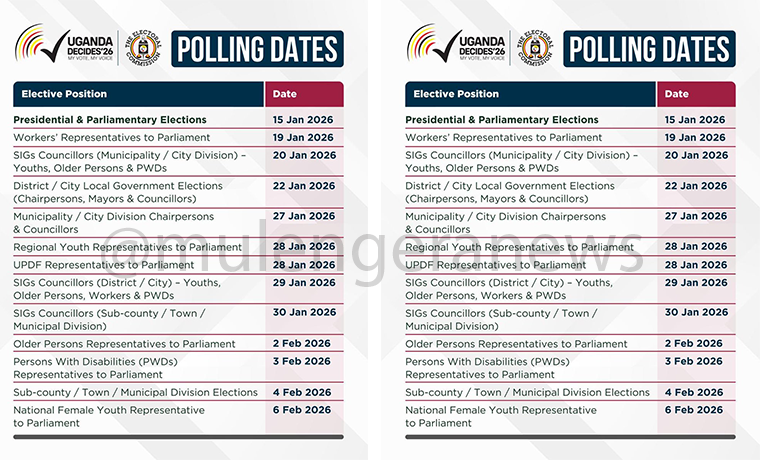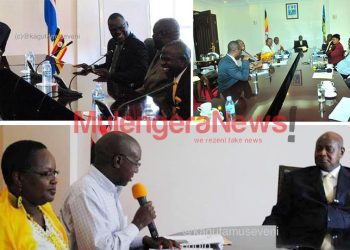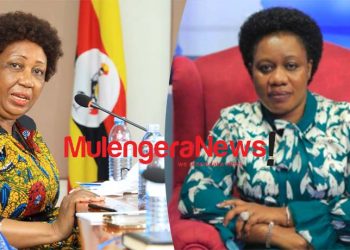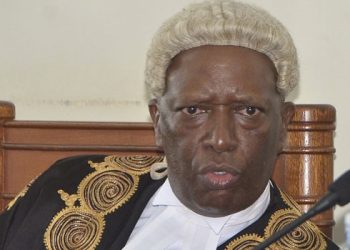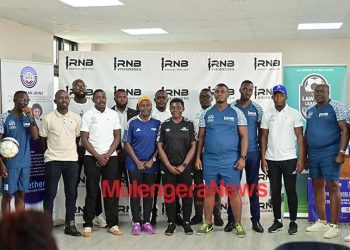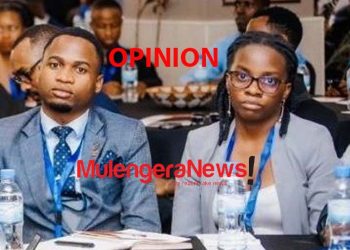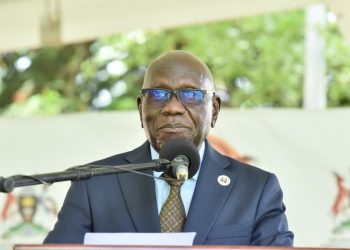By Otim Nape
Incarcerated Boda Boda 2010 supremo Abdul Kitata is an illiterate man who rose from a very miserable background to become the very efficient power broker we all came to know. He was a nobody until around 2009. This is how it started; after being decisively whipped in Kampala by Kizza Besigye in the 2006 elections (which Sejusa says the retired Colonel won), President Museveni became restless. Deep inside his heart, Museveni knew he still wanted to be president but, as the 2006 poll results illustrated, his vote margin had rapidly been declining since 1996. In 2006, Besigye decisively swept Teso, Lango, Acholi, West Nile and Kampala. This created credible fears that Museveni might fail to score the required minimum of 51% of the vote in 2011 because of the wave 2006 had created. He had a meeting of his key political strategists including Moses Byaruhanga and Amama Mbabazi who hoped (against hope) that Museveni would eventually give way for him to become president. In that meeting Museveni desperately wanted to know how to prevent a Besigye win in 2011. Byaruhanga, a veteran of political mobilization in Kampala, proposed money must be invested to capture the Boda Boda industry because these young men’s voluntary participation was giving Besigye a lot of visibility. All previous efforts since the days of Sebaana as Mayor had failed to change Boda riders into Museveni supporters.
 M7 BUYS IN:
M7 BUYS IN:
At that time the Boda industry was being organized under a group called KOBOKA whose membership was voluntary and some riders were unhappy with the leadership of Kabuye who was at the helm of KOBOKA. Museveni was told in the meeting that Kabuye & Co were Besigyeists and must be annihilated from the onset. Kitata then was a low profile struggling illiterate businessman in Natete and owned two boda bikes that had previously been confiscated by KOBOKA operatives for breaching some association rules. He is illiterate but full of self esteem and had been making a lot of noise against KOBOKA and this emboldened many other disgruntled riders and boda owners to coalesce around him. Somehow a pressure group of sorts emerged. Byaruhanga had met Kitata at a Kimeeza program (they were many in early 2000s) and liked the way he was articulating issues in favor of Museveni while castigating KCC politicians like Sebaana Kizito for messing up the Boda industry. To weaken DP in Kampala, State House had previously used Moses Byaruhanga to portray Sebaana as anti-poor and each time the Sebaana administration imposed a levy, Museveni would intervene insisting they shouldn’t be exploited paying the Shs9,000 Sebaana’s KCC had imposed. This didn’t result into votes for Museveni amongst Boda riders. Kitata was informally leading those against Sebaana’s levy in his capacity as a boda owner and not a rider-because he has never been one. One time prior to 2006 campaigns, KCC enforcement officers had an operation during which a frightened boda rider drowned into Nakivubo channel to escape being arrested. Sebaana was Mayor and defended the operation amidst wide spread public outcry. There was a lot of agitation against Sebaana in which Kitata prominently participated. This gave him relevance before Museveni, JPAM and Byaruhanga who were desperate to show this was spontaneous resistance against Sebaana by the riders and not State House. This is how Kitata got closer to Byaruhanga who was then very powerful and influential aide at Museveni’s palace. For sometime Kitata remained the most outspoken Museveni supporter in the Boda industry and was always dealing with Byaruhanga and never Museveni directly. After annihilating Kabuye’s KOBOKA that Museveni was made to hate on grounds it was opposition-leaning and the leaders were brutalizing riders and exploiting riders, there was a leadership vacuum in the boda industry. Yet Museveni was willing to give them financial support only if they operated as an association as opposed to individuals. Byaruhanga was tasked to organize them into groups and the process was on for almost three years as the riders weren’t accepting Kitata on grounds that “yes he was fearless, connected and outspoken but wasn’t a rider.” These leadership wrangles complicated things for Byaruhanga who the riders kept telling Kitata can’t represent them in any meeting with Museveni.
KITATA MEETS M7:
Eventually Byaruhanga organized a meeting and this was after 2011 when Gen Salim Saleh became deputy finance minister and cash became available to support poor groups in Kampala under Microfinance Support Center. Museveni demanded to meet these groups first which was an opportunity for him to meet and thank Kitata whose anti-opposition activities he had always heard about. In that meeting it was clearly stated, at the insistence of the riders that Kitata is presented as the patron of the group and not a member or one with any leadership position. They agreed since he is confident and eloquent in Luganda, Kitata speaks on behalf of the group enumerating their problems to Mzee. He did this very well and Museveni even called him for a handshake as he moved to resume his seat. In that meeting, Kitata also spoke of some remnants of KOBOKA that he said were working with police to even co-manage traffic flow in the city. They had been given pink jackets for identification at the round-abouts. Meanwhile Kitata (a social climber), who always wanted access to as many big people in NRM as possible, got access to Mbabazi still through Moses Byaruhanga. JPAM was then very powerful and meeting him was as good and as empowering as meeting Museveni. Jacqueline, who had somehow started imagining JPAM becoming presidency, always suspected Gen Kale Kayihura to be the other Museveni loyalist in the queue that Museveni might consider anointing for a successor in 2016 (the Mbabazis always had their eyes on 2016). So in the subsequent meetings with Museveni, Kitata was assigned by the Mbabazis to demonize Kayihura as much as he can. They made him think that Kayihura was the godfather for KOBOKA whose excesses Kitata’s group were out to fight. He talked ill of Police and specifically Gen Kayihura.
 KAYIHURA SWINGS:
KAYIHURA SWINGS:
Now those who know him well will tell you, Gen Kayihura likes reaching out to those considered against him especially when they have audience and capacity to accuse him to the President. Kayihura looked for Kitata and asked him “Ndugu why are you fighting me?” Kitata said “no sir I was just misled.” This is how Kayihura became very close to Kitata and through him it became much easier for Kitata to regularly meet Museveni than it was through Byaruhanga and JPAM. In fact Kayihura was to later use Kitata and others to make a case before Museveni that indeed there was evidence JPAM had presidential ambitions. For Kitata, Kayihura was more attractive for many reasons including being more generous than JPAM and Byaruhanga. As part of the bonnabagawale program, Museveni promised some money to BODA BODA 2010 that was subsequently formed and eventually Shs250m came through Byaruhanga. It came through Kitata as a patron who was to oversee its distribution. Members came to Byaruhanga saying “we didn’t get the money” and both Byaruhanga and JPAM demanded that Kitata is investigated and prosecuted. So he needed Kayihura’s protection to escape such accountability problems though he was later on summoned and made to explain in Parliament after the Auditor General wrote a forensic report and queried the Shs250m. In fact Byaruhanga had to go to parliament to explain himself has well. Kayihura won over Kitata by assuring him he would talk to the President and all would be well and indeed up to now the PAC report authored by Kassiano Wadri indicting Kitata and others has never been implemented. So apart from getting money, Kitata liked IGP because of this assured protection. But Kayihura was also not very scrutinizing unlike JPAM and Byaruhanga who would ask many questions each time Kitata demanded facilitation. Byaruhanga even tried to get Kitata work with opposition radio callers like Luba Kyoya, Isaac Mutyaba etc but they fell out over accountability issues. Kitata sidelined them.
BODA BODA 2010: This group that was launched at a grand ceremony attended by Museveni grew in influence in Kampala mostly during the time when Andrew Sorowen was Commandant KMP. They worked very well with him and Kayihura ensured whoever became KMP boss was briefed to closely work with Boda Boda 2010. This is how Felix Kaweesi, who replaced Sorowen and Turyagumanawe, came to work very closely with Kitata in KMP including walk to work. This meant whatever budget Kitata came up with for whatever operation, the KMP head had to just finance it without question. That was the order of the IGP and these classified expenditures made Kitata very rich. At the time the President launched Boda 2010, other rival groups existed and it became Sorowen’s assignment to make sure they either surrender to 2010 or be obliterated. Many were arrested and framed until they surrendered or fled the city. Kitata had to emerge the supreme leader of the boda industry. Without going through any procurement process, they had power to levy Shs40,000 for any traffic offense or else one’s bike would be confiscated. This is what Kitata has been using to maintain the Boda 2010 offices in all city divisions. Each has staff whose salary he has been paying. It’s also believed that, imagining Museveni would quit in 2021 and leave the chair for him, Gen Kayihura sought to rely on Kitata’s 2010 network to grow his presence in case Museveni annointed him successor. Besides the Crime Preventers of Blaise Kamugisha, it was thought Boda 2010 would come in handy. On this assignment, Kitata has been controlling 200 boda bikes that were specially procured. These would be a phone call away each time the IGP required urgent mobilization for Mzee anywhere in Kampala. These had to report on call without any excuses like “I don’t have fuel.”
SHELL WANDEGEYA INCIDENCE:
So powerful and untouchable had Boda 2010 became that one time, after failing to access police facilitation for months because IGP was too busy out of the country, Kitata’s 2010 men stormed Shell Wandegeya demanding to be facilitated. They stormed the office of the elderly lady who owns the Shell fueling stations which police contracts to supply fuel. The woman became nervous and rang former IGP PA Jonathan Barooza who drove to Wandegeya to rescue her. The Boda 2010 guys had already forced their way into the cash room and when Barooza furiously rang Kitata, he arrogantly replied “ofcourse even the IGP knows that those boys need money.” Barooza was furious and tried to sideline Kitata but the bond between him and IGP was too strong to be broken. On another occasion Barooza protested when Kitata turned up to the cash office saying he had been instructed to pick Shs200m. Barooza, backed by some powerful police directors, hit the roof saying “over my dead body” but he ate his swords when the IGP was contacted and okayed Kitata’s claim ostensibly to go and execute some clandestine operation. Crippling Barooza made other police bosses realize that Kitata was powerful and you couldn’t step on him and get away with it. Quite often his Boda 2010 boys would beat up police officers in stations around Kampala and IGP would do nothing yet the DPCs needed his clearance to do anything. We all saw the impunity with which Kitata’s men beat up children in Busega and in the process assaulted even police officers. There was also a one Mawejje who was the IGP’s driver who lost his job for trying to stand in Kitata’s way. There is also a police Director called Twino who one time questioned Kitata’s powers, the facilitation he was taking and was shut up immediately in top management. In the end Kitata joined the list of IGP Kale Kayihura’s men that were beyond questionable; the others being Blaise Kamugisha, Nixon Agasirwe, Barooza and Richard Ndabwine. Kitata, who sources say had future political ambitions and was secretly planning to return to school, had plans to join Parliament in 2021. His plan was to become one of the workers’ MPs and was targeting one of the incumbents. Knowledgeable sources say this is why he was heavily involved in the transport union trying to use his taxis and Boda constituency to come to the Electoral College. It’s said Gen Kayihura had endorsed this and had promised him funding. This is why Kitata has been using Mustapha Mayambala of DACCA to consolidate their union uniting boda and taxi drivers in Uganda. It was work in progress and this is the reason they have been at loggerheads with Beti Kamya and even Jeniffer Musisi earlier on.
LOSING M7 FAVOR:
When Beti Kamya was made Kampala Minister, she propped up one of her long time supporters Mrs. Kafeero of Nakulabye. Kafeero is well known because she was Kizza Besigye’s supporter there for many years and Kamya encouraged her decision to defect to NRM. She is a fighter and combative-exactly with similar credentials like Kitata’s. So Kamya fronted her as a proxy to counter Kitata whose major political operations are based in Rubaga. Kamya took her to Museveni many times and her talkativeness and claim to know KB’s political secrets excited Museveni who began seeing her as an alternative to Kitata. This meeting annoyed Kitata who started quarrelling how Museveni would connive with Kamya to hold a meeting to discuss mobilization in Rubaga without his consent. Being who she is, Kafeero also called a news conference and bashed Kitata saying he was a nobody. Kitata responded with another press conference. It was here that he was led by scribes to attack Museveni directly. “As long as I’m the NRM chairman in Rubaga, Museveni won’t come here for any event that I’m not involved in,” Kitata recklessly said. Unknown to him, Kafeero and Kamya procured this recording and played it for Museveni in a subsequent meeting. Museveni was naturally very infuriated and asked the two “Who is this Kitata? We shall see between me and him who is in charge of this country.” Since that time, Museveni shunned Kitata and resisted all proposed meetings with any of his delegations. Meanwhile there was pressure from Henry Tumukunde, Gen Saleh and other influential first family members to do something on Kitata. Museveni, who was already angered through the Beti Kamya audio, acquiesced to this plan and it remained a question of when. Museveni security apparatus began looking for an opportunity to demystify Kitata and this evidently came this week. Mrs. Kafeero had organized a meeting of market vendors and Boda riders whom she wanted Museveni to meet as defectors from opposition. Suspecting the big man from Rwakitura would characteristically release money to this group, Kitata became jittery and demobilized against Museveni’s function in order to show Kafeero and Kamya are poor mobilizers. To his humiliation, the function went on and Museveni came and cheerfully addressed the gathering.
FINALLY THE ARRESTS:
We have reliably been informed that before moving in to apprehend Boda 2010 officials, Museveni had tasked ISO to compile for him profiles of the 100 most powerful officials in the group. What they, who they are, who they work with, what they own and their previous criminal record. Bad for Kitata, Gen Kaka found many disgruntled riders who freely gave him all the raw intelligence about Kitata and other officials. After getting everything, Museveni called a meeting where Kaka explained “sir I have done my part but as ISO we can’t carry out arrests because we don’t even have cells where to detain these people from.” Afande Mzee Sabiiti the Commandant military police (and former chief SFC) was in the meeting and Museveni directed him to be the one to oversee the operation to arrest Kitata & Co. Kaka had the details of their offices, residences and work schedules. This is why Kitata & Co seemed to have been caught unawares. But another source says Kitata knew that something was coming but wasn’t sure how soon. “This is why he had the opportunity to go meet Gen Kale in Kigo who assured him things were bad,” said a source insisting Kitata knew but the raid came sooner than he expected.
WHO IS KITATA?
Briefly we established that Kitata, a devout Muslim, hails from Butambala where his great grandparents of the Rwandese origin first migrated more than 100 years ago. His father later migrated to Nakasajja village in Kyampisi Sub County Mukono district. This place is accessed through Gayaza and Kitata has his country home there. Sometime back, police bosses envious of his riches tipped Daily Monitor journalists to go and photograph the house and Kitata caught them red handed. He immediately ordered for their arrest and had them caged in Nalufenya for days until IGP intervened for their release. Kitata has many sisters including a one Nassimbwa who works as Chief Administrator at FDC headquarters Najjanankumbi. He likes pomp and has made good use of the lead car and police patrol Gen Kayihura had designated to guard his residences in Nakasajja, Rubaga and Kyengera. Whenever he enters his favorite restaurant (2K) of Bakuli, a larger section is cut off to enable him seat comfortable with the large group of henchmen (baperegesi) he always comes with. He is generous and will buy food for everyone. He isn’t very vindictive; he forgives very easily. He is generally media friendly and ever in a hurry. The other thing about him is that he played a role in annihilating Mbabazi whose camp he tried to rejoin (perhaps on a spying mission) after the Mbabazis fell out with Sebina Sekitoleko in late 2014. This is why Museveni trusted he had an idea on how to obliterate the NRM poor youth movement of Adam Luzindana. Indeed when the NRM youth league led by Dennis Namara became a problem opportunistically opposing Evelyn Anite’s sole candidate proposal, Museveni insisted on calling a meeting of many NRM youths and not just leaders. These filled State House and heckled Namara, William Seruyinda, Robert Rutaro, Omodo-Omodo Adam Luzindana and other youth league executives into submission. Kitata mobilized this mob for Museveni and even went on his knees, joined by senior youth Sewava Mukasa, begging Museveni to expel JPAM from government. That picture did the rounds on social media with many questioning what qualifies Kitata, a man clearly appearing to be old, to be a youth. But that is Kitata; very shameless and desperate for attention of the big people. In 2015 he determined to become NRM chairman Rubaga replacing Ziada Sebuliba whom he accused of being a Mbabazist. Deborah Mbabazi was the RDC Rubaga and tried to insist on properly organized party elections but IGP-backed Kitata was too much for her. Kitata chased away all would-be competitors and filled the place with Boda 2010 members from all over Kampala and these are ones who voted him NRM chairman. “He badly wanted that seat because it ensures he attends all big party meetings and rub shoulders with big shots. But more importantly it’s a sure way to continue accessing Mzee with or without Kayihura’s support,” said a source that knows Kitata pretty well.


















